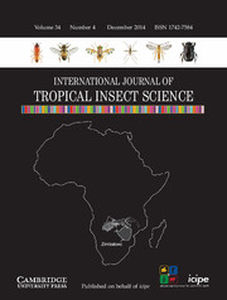Crossref Citations
This article has been cited by the following publications. This list is generated based on data provided by Crossref.
BURSELL, E.
1984.
Observations on the orientation of tsetse flies (Glossina pallidipes) to wind‐borne odours.
Physiological Entomology,
Vol. 9,
Issue. 2,
p.
133.
Tchouassi, David P.
Jacob, Juliah W.
Cheseto, Xavier
Chepkemoi, Lydia S.
Hassaballa, Iman B.
and
Torto, Baldwyn
2024.
Enzyme-catalyzed kinetic resolution of racemic 1-octen-3-ol and field evaluation of its enantiomeric isomers as attractants of sandflies.
Frontiers in Tropical Diseases,
Vol. 4,
Issue. ,
Parmar, Dipali
Verma, Subhash
Sharma, Devina
and
Singh, Ekta
2024.
Semiochemical based integrated livestock pest control.
Tropical Animal Health and Production,
Vol. 56,
Issue. 2,


